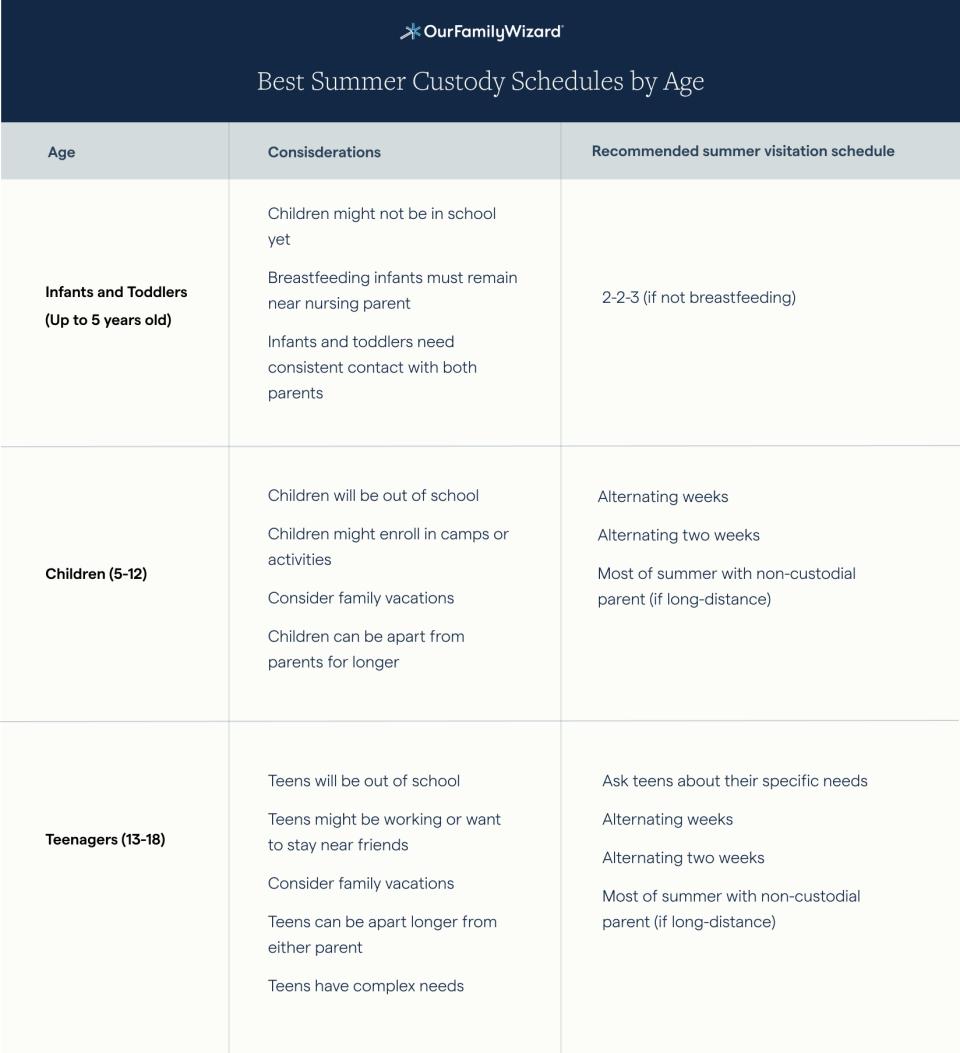
Summer can be exciting for families, but visitation changes can be stressful. Plan for summer effectively with this comprehensive article. Explore all the summer visitation schedule options and gain insights from family law experts to find your ideal schedule.
Inside this article:
Summer visitation outlines how co-parents distribute parenting time when the child is out of school. Many co-parents change their parenting schedule over the summer to accommodate the change in routine. The best summer visitation schedule depends on your specific circumstances.

The start of summer break brings significant changes for school-aged children and their parents. Without the structure of an academic school year, children have far more free time. For co-parents with shared custody, adapting to the summer can be challenging . In fact, it often requires a new parenting time arrangement that allows for activities like summer camps or family vacations that don't fit into the regular school year routine.
"During summer, school-aged children don't have the academic calendar to guide their routine," explains Kristina Jarvis, a family law attorney licensed in Illinois since 2000 and South Carolina since 2020. “Without school, summer takes on a rhythm of its own. Children might participate in camps or extracurricular activities. Plus, co-parents usually want to take advantage of this time to spend vacations with them. It's crucial for co-parents to recognize summer as a distinct period and ensure their parenting schedules can accommodate the changes the season brings.”

Co-parents typically come to an agreement about summer visitation when they're building their parenting plan. Some co-parents maintain the normal school-year schedule, while others make significant changes. The best parenting option depends on your specific situation.
Ketan Soni, a board-certified family law specialist in North Carolina, emphasizes that, like most things related to parenting, how you handle summer depends on your circumstances.
"Whether or not you change the schedule in summer depends on a lot of variables that change with each family," he says. "The normal schedule, the age of the children, and your co-parenting dynamic will come into play. Overall, the goal is to put the children first and ensure both co-parents have the opportunity to create memorable summer memories, like taking vacations or sending their kids to camp.”
Whether you choose to keep or change the schedule, experts agree it's best to consider summer early instead of letting it sneak up on you.
"We all want our clients to approach summer proactively,” Jarvis says. "When creating the parenting plan, outline summer in a forward-thinking way that changes with the age of your children. Then, once the new year rolls around, be sure you have an idea of how you're going to spend the summer, whether that's on vacation or enrolling your child in camps. Planning ahead of time will save everyone stress and set your child up to have a great summer.”
Soni adds, "Remember, summer should be fun for your child. As with all things co-parenting, it’s always best to approach summer visitation with the goal of creating the best outcome for your child.”
Key takeaways:
Summer visitation schedules delineate where the child will be during the summer. Some co-parents keep their normal schedules and add vacation time for both parents. Others switch to a different schedule, like alternating weeks or months, especially when there’s a long-distance parent.
"Your summer schedule might vary from your regular school-year routine, or it may stay the same," explains Jarvis. "The extent of change in your schedule depends on a variety of specific factors. For instance, some parents who share custody equally often keep their schedule consistent throughout the year; others with more frequent parenting time exchanges, such as a 2-2-3 custody schedule , may decide on a schedule with fewer exchanges, such as a week-on, week-off schedule. In long-distance co-parenting situations, it's common for the noncustodial parent to have the child for a larger portion of the summer. With endless possibilities, the ideal schedule depends on your individual circumstances."
Here are common ways that co-parents approach summer visitation:
This option is particularly appealing to co-parents who already follow a 50/50 arrangement during the school year and meet conditions that make 50/50 doable, like living close to one another. One significant benefit is that sticking to the normal routine eliminates the need for summer adjustments, providing a reliable, routine schedule. Plus, with the vacation options, both co-parents know they’ll still enjoy one-on-one parenting time with their child.
Sometimes, sticking to the same routine can be challenging if your child is involved in summer camps with a unique schedule that the normal routine can’t accommodate.
Jarvis shares this insight: "In cases where one co-parent is long-distance, they might only see their child for a weekend every few months. To make up for the loss of parenting time, it’s common for co-parents to agree that the long-distance co-parent should have more parenting time in the summer. In this arrangement, the noncustodial co-parent has the children for the entire summer, except for the week after school ends and the week before it begins. Another arrangement is for the noncustodial co-parent to have the first two months of summer, with the other co-parent taking the last month. This arrangement helps the child acclimate back to their regular routine before school starts."
Soni adds, "Long-distance co-parenting is relatively rare, but when it does occur, summer presents a great opportunity for the long-distance co-parent to have extended time with their child."
If the co-parents reach an agreement, courts usually won't intervene. However, most states have guidelines or standard orders that allocate a certain number of consecutive weeks for noncustodial parents during the summer. These guidelines come into play when parents can't agree on a schedule or as a default in custody agreements, but specifics can vary greatly from state to state.

Below, we’ll list some of the most common parenting schedules used during the school year. Considering these can help you visualize potential changes for the summer. Additionally, apart from these regular schedules, each co-parent typically has a week or two of uninterrupted parenting time for vacation in the summer. Remember, you can adapt these schedules for summer. We’ll also outline the summer-specific pros and cons.
50/50 visitation splits:
Pros: This arrangement ensures an equal sharing of time over two weeks, which can be particularly beneficial for younger children who find longer separations challenging.
Cons: The downside is the high frequency of transitions, which might be more complicated in the summer without the regularity of school drop-offs and pickups. It also might be difficult to track the exchanges and coordinate summer activities, especially because each parent’s specific days change every week.
Pros: This schedule strikes a balance between maintaining frequent contact and reducing the number of transitions, offering a rhythm that can be more relaxing for both children and parents.
Cons: Co-parents may struggle to plan summer activities around this schedule. For some parents or children, five nights might feel too long to be apart.
Pros: This schedule balances exchanges with time. It requires only two weekly exchanges, and the children don’t spend an extended period away from either co-parent.
Cons: It may require more planning to keep track of the alternating days, which could be a bit more complex for scheduling summer activities.
Pros: This straightforward schedule provides a balanced approach with fewer transitions, allowing for more stable and predictable summer planning.
Cons: Like the two-week alternating schedule outlined below, the week-on, week-off pattern might be challenging for children who struggle with longer separations from either parent.
Pros: This schedule simplifies logistics significantly and allows both parents and children to enjoy extended time together without the interruption of frequent exchanges.
Cons: The main drawback is the longer interval between visits, which might be difficult for younger children or those who need regular contact with both co-parents.
Here are some other schedules:
Pros: This schedule allows the children to attend uninterrupted weekday summer camps while spending time with one parent. It provides the other parent a consistent opportunity to spend weekends together. It could work well when the noncustodial parent doesn’t normally get weekends in the summer.
Cons: One co-parent misses out on the unique weekday experiences of summer, like impromptu outings or relaxed routines. That could lead to a feeling of imbalance, where one parent handles most routine summer responsibilities while the other is perceived as the “fun weekend parent.”
Pros: An alternating-weekend schedule gives children a stable routine during the week, making it easier for them to participate in continuing summer activities like sports leagues or camps. It also ensures that both co-parents can plan special weekend getaways or spend time on the weekend with the child.
Cons: The parent without the children on weekends may miss out on classic summer weekend experiences like beach trips or barbecues. That might create a sense of disjointedness in summer planning, with each parent possibly having different approaches to weekend activities. Also, the parent who has the child only on weekends misses out on the weekday routines and activities.

The best summer schedule depends on your child’s age. For infants, stick to a single routine throughout the year. Younger school-aged children can handle alternating weeks or even months. Teenagers have complex needs, so it’s best to talk with them about their ideal schedule.
What’s best for your child changes as they grow. Here’s a summary of the best summer custody schedules by age. This list assumes that the co-parents live close enough and are splitting the summer instead of giving the noncustodial co-parent the entire summer.
Soni offers a pragmatic approach. “I recommend the alternating-weeks schedule during the summer, especially for school-aged children who can manage a week without seeing either co-parent.”
He also highlights the practicality of this arrangement: “It’s straightforward to track and creates a stable routine for everyone. It also makes vacation planning more manageable. You can align your holiday plans with the weeks you have the child. This method is financially and logistically straightforward, especially if the co-parents live relatively close to each other.”
“It’s incredibly important to get your teen’s input on what they want to do during the summer,” stresses Soni. “They might want to take a job, hang out with friends, or avoid frequent exchanges. In cases of long-distance parenting, they may not want to leave town for an extended period. On the other hand, some teenagers might welcome a change from their usual routine. The key is to recognize that teens seek a degree of independence. You can either enforce your legally granted parenting time or collaborate with them to find solutions that respect their needs and experiences.”
Alternating weeks can be effective for teenagers, especially if the co-parents live close by, as it accommodates their social activities, potential jobs, and summer school commitments. If co-parents live far apart, discussing with the teen whether they want to spend an extended period away is essential. Alternating every two weeks might also be a viable option.
When planning summer custody, key factors include the child’s age and whether their routine will change in the summer. Then, consider if the co-parents’ work schedules change. Also, consider incorporating activities like summer camp or extended travel.
Jarvis, Soni, and other experts recommend co-parents consider key questions when deciding on a summer custody schedule. Review this list to help determine which schedule can fulfill everyone’s needs, especially the child’s.
"Unfortunately, it's quite common for co-parents to focus more on the quantity of days they have with their children rather than the quality of those days," Jarvis observes. She emphasizes the importance of prioritizing the child’s experience.
Navigating the summer schedule options can feel overwhelming. Our free summer visitation template simplifies this process by offering a comprehensive overview of all the schedules. Overlay your own important events to compare and customize each schedule to find the best fit for your family.

Experts recommend that co-parents approach summer custody like any other important co-parenting decision. Try to be proactive and flexible when planning and managing summer schedules. Another tip is to help children adjust to any significant schedule change.
These summer planning tips from experts apply to noncustodial and custodial parents alike.
“Some of these camps open registration in January, and they fill up quickly,” says Soni. “Be proactive and do your research ahead of time on different opportunities in your area that will work with the summer schedule. Then, as a family, you can all choose an activity that the child will be excited about. But, if you wait too long, you’ll have far fewer options.”
It’s important to consider the summer separately from the school year because of the season’s unique characteristics. This approach ensures that you accommodate summer activities like camps and vacations. It will help you create the most effective parenting plan for co-parents and children.
Experts agree that summer break comes with a change in routine and expectations and a different vibe. Trying to make the school-year schedule fit a new time won’t work for many families.
“Adapting the custody schedule for summer is not just about logistical convenience; it's about fostering an environment where children can experience the full joy and freedom this season offers,” Soni says.
“It’s a time for them to create memories, explore new interests, and enjoy a well-deserved break from the academic year. For co-parents, it’s an opportunity to connect with their children in a more relaxed setting and share in these precious moments. By considering a flexible and thoughtful custody arrangement for the summer, co-parents can ensure that this season remains a special and cherished time for their children, free from the stress of rigid schedules and missed opportunities.”
Jarvis agrees. “There’s just more time for everyone in the summer. Co-parents will want, first and foremost, to have some uninterrupted vacation time with their children. Children will want to go to camp or be with friends.”
“But a custody schedule that worked during the school year can create obstacles in the summer—for instance, if a summer camp requires a week-long stay, but the custody schedule only allows for shorter periods with each parent. Or if camp drop-off times clash with the designated custody exchange times. In such scenarios, a typical parenting schedule could prevent the child from engaging in enriching experiences. Prioritizing the child’s summer experience means ensuring a schedule that supports their desired summer activities.”
Don’t let scheduling hassles interfere with the summer break. OurFamilyWizard’s shared Calendar makes it easy to create and track summer schedules. Its other features also help ensure a smooth summer, like sending vacation requests and communicating with your co-parent about plans or changes.
The OurFamilyWizard shared Calendar caters to the specific demands of co-parenting, setting it apart from other scheduling tools. The versatile calendar handles any parenting time schedule, from 2-2-3 rotations to every-other-weekend . You can even set up a separate summer calendar distinct from the regular school-year calendar, so it’s easy to switch back and forth between calendars without losing your patterns. This dual-calendar approach gives you a comprehensive, holistic view of your annual schedules.
OurFamilyWizard also offers more features to support co-parenting. Summer brings unexpected opportunities, and if your child can visit a friend or attend camp, OurFamilyWizard's schedule change request tool in the Calendar feature allows for easy schedule adjustments. If you need to discuss any changes with your co-parent, you can message them in the app. It’s coordinated co-parenting, all in one app.
Try OurFamilyWizard and help your family get the most out of the summer.

/sites/default/files/media/image/2023-10/headshot-danielle-kestnbaum.jpg
Danielle earned her law degree with honors from IIT/Chicago-Kent College of Law in Chicago, Illinois. Prior to graduating from law school, she received her Masters degree in Social Work from Columbia University in New York City and a BA from Brandeis University in Waltham, Massachusetts.
Danielle externed with the Chief Judge of the Domestic Relations Court for the Circuit Court of Cook County during law school. She has worked in the public sector as a child’s advocate and also in the private sector representing parents in a broad range of family law matters.
She currently works as a professional liaison for the OurFamilyWizard website and serves as the Vice President of the North Carolina Chapter of the Association of Family and Conciliation Courts.